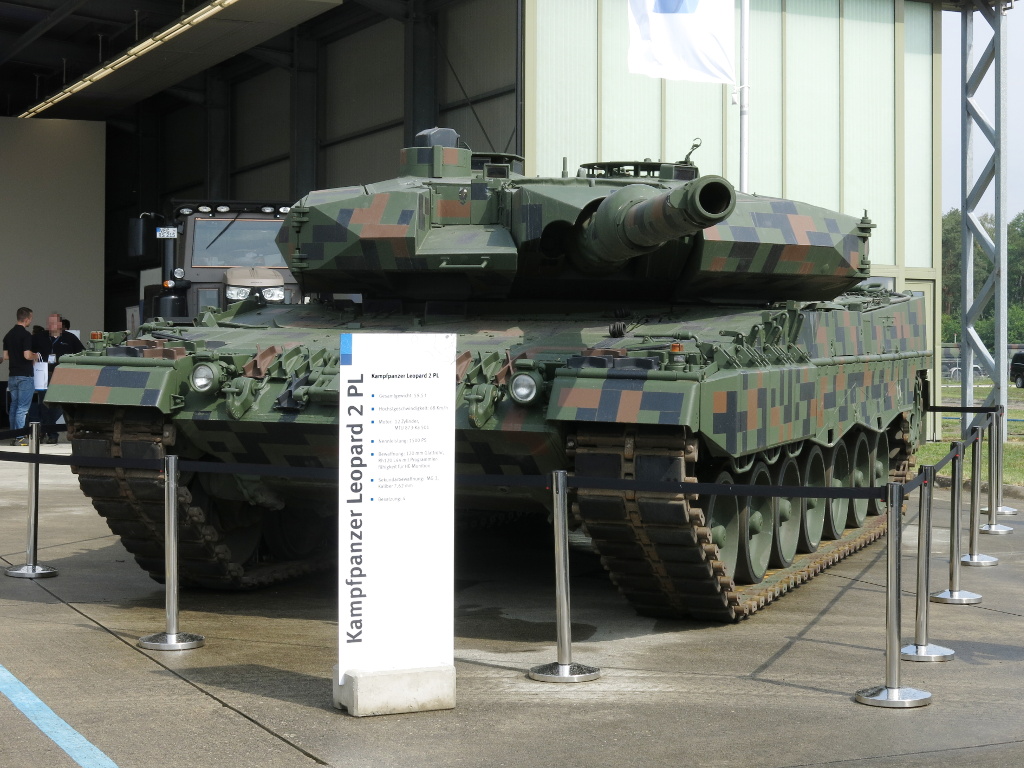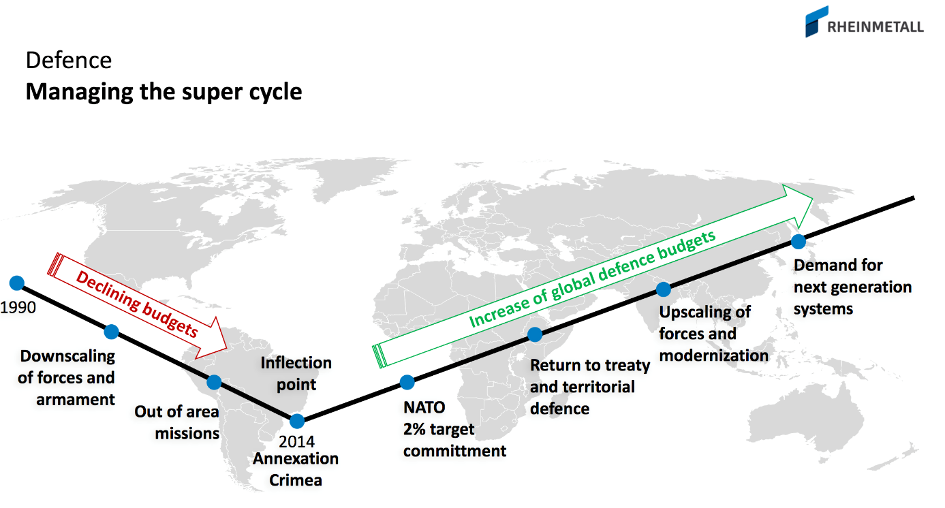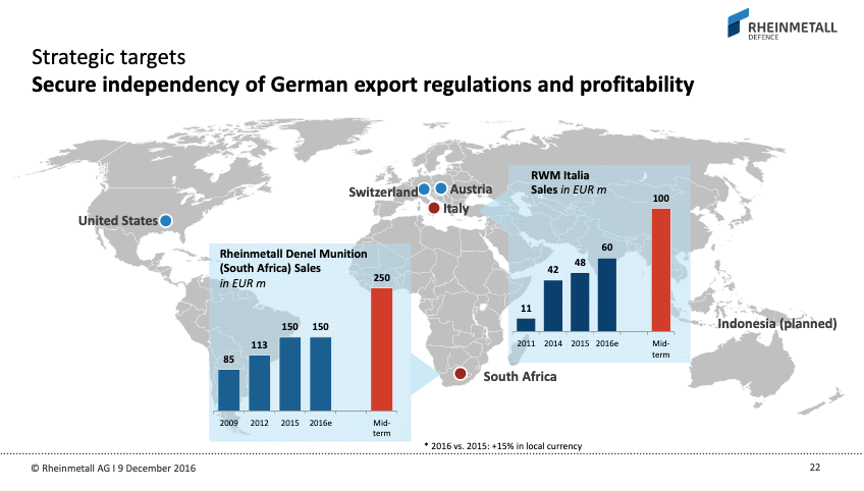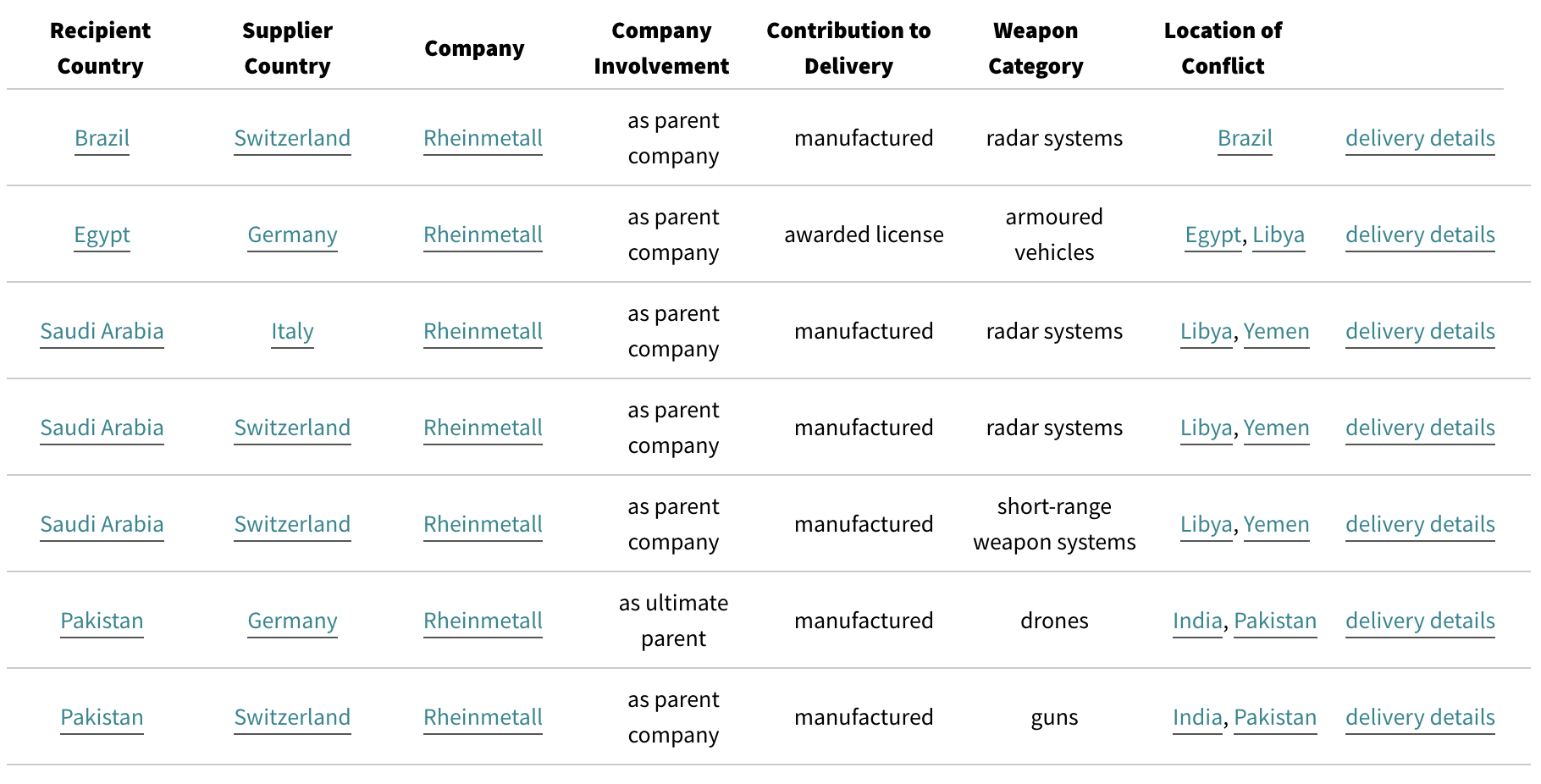Ukraine War: Good Times for the Arms Industry

The war in Ukraine skyrocket the stock of Germany's largest arms manufacturer, Rheinmetall, to record levels. On the eve of the Russian attack, it stood at around 95 euros, two month later in April 2022 at 214.8 euros. An increase of 150 percent. Rheinmetall can look back not only on an economically successful fiscal year 2021, but also on a rosy future. The company consists of two divisions, Automotive and Defence. The Defence sector now dominates with a 63 percent share of sales and is expected to rise to around 70 percent in 20251. In 2021, arms sales of around 67 percent of total sales went to countries in the European Union, 42 percent to non-EU countries, in particular Australia and parts of the MENA region (Middle East and North Africa)2.

Figure 1: Rheinmetall analysis of the economic environment for defence companies, 20204.
Rheinmetall is benefiting from the plans of Germany and numerous other EU countries to invest heavily in their own armaments in response to the war in Ukraine. On the spot, the Group doubled its expected sales increase from 10 to 20 percent for the current year3. In the current debate about arms deliveries to Ukraine, Rheinmetall is also ready and waiting, eager to get as much of the cake as possible. Rheinmetall presents itself as a loyal partner and continues to work on its image as a sustainable company.
However, this ignores the fact that Rheinmetall supplies armaments and ammunition to countries where demand is high. Red lines for countries that are not supplied due to the human rights situation or participation in wars do not seem to exist. Rheinmetall arms autocrats and conflict regions. Despite the annexation of Crimea, Rheinmetall would have delivered a combat training center to Russia in 2014, where 30,000 soldiers per year were to be trained for war. When the German government prohibited it, the company filed a lawsuit.

Figure 2: Slide from a presentation by Rheinmetall in December 2016.
Strategy: Becoming independent of German arms export regulations
Since some arms exports are not always possible without restrictions under German arms export rules, the strategy in 2016 was very openly to make itself independent of German arms export regulations by internationalization (setting up partner companies or subsidiaries outside Germany) and working with local partners to create new "home markets" that would make the local industry more independent of imports5. From its sites abroad, Rheinmetall develops and supplies weapons and entire ammunition factories to other countries, without these deliveries having to be approved by Germany. Profits flow back to the parent company in Germany.

Preview of Rheinmetall exports to waring states covered on ExitArms.org, access the complete list here.
Besides Germany, Rheinmetall Defence has production facilities in nine other countries (Canada, USA, UK, Austria, Switzerland, Italy, South Africa, Australia and Hungary)6. For a long time, the sites in Italy (RWM Italia) and South Africa (Rheinmetall Denel Munition) were considered particularly relevant to the internationalization strategy. RWM Italia produces naval ammunition, bombs, guided weapons and explosives7. RDM, founded in 2008 by Rheinmetall and Denel in South Africa, produces mainly ammunition and ammunition components8. Both sites continued to supply bombs and ammunition to Saudi Arabia even after Saudi Arabia entered the war in Yemen (2015). Since 2018, no weapons may be supplied to Saudi Arabia or the United Arab Emirates via Italy. Also in South Africa deliveries to Saudi Arabia were prohibited, but the export ban is lifted again9. Saudi Arabia and the United Arab Emirates were at times the most important customer for RDM10.
Particularly problematic: the export of entire munitions factories
A particularly problematic export of the South African subsidiary RDM is the sale of entire munitions factories to countries such as the United Arab Emirates, Saudi Arabia or Egypt. Even though these are not directly listed in ExitArms, as SIPRI does not record these types of exports, numerous of these plants have been built worldwide to date. The Group advertises that it offers its customers turnkey ammunition factories11. Rheinmetall profits not only from the construction of such factories, but also from long-term supplies, technical services and license payments. One of the most serious consequences of these exports is that it makes the recipients, most of whom are involved in wars and conflicts, less dependent on arms embargoes and that this further encourages the armament of crisis regions. With the effect that more and more weapons end up in the hands of questionable governments. The construction of such facilities therefore serves the interests of the mostly autocratic government recipients and at the same time the profit interests of the Rheinmetall Group.
Examples of known ammunition factories:
- United Arab Emirates (UAE): Back in 2008, Rheinmetall began construction of a turnkey plant in the UAE for filling grenades, mortar and artillery rounds, unguided rockets and bombs. RDM supplied the technology.18 RWM Italia and RDM provided technical and supply support for the operation12.
- Saudi Arabia: In 2016, another such facility was commissioned at al-Karij in Saudi Arabia, which is operated by the state-owned Saudi Military Industries Corporation13. The munitions factory produces, among other things, the very 120 mm mortar shells that, according to Bellingcat's research, are also believed to have been used in a 2018 attack on a hospital in Hodeidah that injured or killed over 100 people14.
- Egypt: According to media reports, 2018 another plant is believed to have gone into operation in Egypt. Publicly, it is mostly referred to as a customer in North Africa15. And a recently reported order for the modernization of a production facility in the Middle East is also likely to be related to the Egyptian weapons factory16. Even if these facilities do not belong directly to Rheinmetall AG, the company is involved in the operation of ammunition factories, among other things through subcontracting, which produce hundreds of lethal projectiles every day, e.g. for the war in Yemen, which is illegal under international law. And the construction of more plants is expected in the coming years.
Accused in The Hague: aiding and abetting war crimes
In December 2019, human rights organizations ECCHR, Mwatana for Human Rights from Yemen and partner organizations from Europe filed a criminal complaint with the International Criminal Court, including against Rheinmetall for involvement in war crimes in Yemen, through arms deliveries to Saudi Arabia and the UAE after 2015. More information on the case: https://www.ecchr.eu/fall/bombenangriffe-made-in-europe/
Killer robots made in Germany
Rheinmetall offers the "Mission Master", a weapon system that represents the beginning of the development of autonomous killer robots. The system is an autonomous robotic vehicle that is also available in an armed reconnaissance version. In addition, a variant that serves as a carrier platform for a kamikaze drone was also presented17. So far, Rheinmetall does not yet offer fully autonomous killer robots. But the Mission Master is already the entry into a development in which ultimately a loss of human control is accepted in order to gain a military advantage in the future18.
A contradiction: Rheinmetall social and sustainable
Rheinmetall's latest coup: the armaments group joined the UN Global Compact in May 2021. The Group committed to promoting ten principles on human rights and environmental protection. In general, the Group is currently striving for a social and green image to be not excluded from a possible social taxonomy.
Human rights, sustainability and arms production do not fit together; it primarily serves green and "social-washing". It is about polishing up the reputation, not least for the financial world.
A company like Rheinmetall, whose weapons are demonstrably used against civilians19 in war zones such as Yemen, cannot per se fulfill the criterion of sustainability, even if the weapons could be produced in a 100% ecologically sustainable manner, because sustainability also means acting in a socially forward-looking manner. And this applies not only to the manufacture of a product, but also to its use.
The company ignores the fact that innocent civilians die in the world's wars - partly as a result of its own weapons - or that important infrastructure such as hospitals or schools is destroyed, plunging the people living there into ever greater hardship.
If Rheinmetall is really serious about signing the UN Global Compact, this also implies ensuring that its own weapons are not used in actions that violate international law or that the company stops arming autocrats and despots by building entire munitions factories. So far, however, there has been no sign of such a turnaround in the company's business strategy.
Footnotes
1. https://www.deraktionaer.de/artikel/aktien/rheinmetall-massiver-umbau-neue-ziele-die-details-20225194.html↩
2. Answer to a question on the Annual General Meeting 2022↩
3. https://www.rheinmetall.com/de/rheinmetall_ag/press/news/latest_news/index_30272.php↩
4. https://ir.rheinmetall.com/download/companies/rheinmetall/Presentations/20210423_RHM_Corp_Presentation_March_2021.pdf↩
5. https://ir.rheinmetall.com/download/companies/rheinmetall/Presentations/RHAG_IR_CMD_2016_Presentation_3%20Defence.pdf↩
6. https://ir.rheinmetall.com/download/companies/rheinmetall/Presentations/220316_Rheinmetall_Conference_Call_Q4_2021.pdf, Slide 9 ↩
7. https://www.rheinmetall-defence.com/de/rheinmetall_defence/company/divisions_and_subsidiaries/rwm_italia/index.php↩
8. https://www.rheinmetall-defence.com/de/rheinmetall_defence/company/divisions_and_subsidiaries/rheinmetall_denel_munition/index.php↩
9. https://www.defenceweb.co.za/industry/industry-industry/r5-billion-in-defence-exports-to-the-middle-east-are-unlocked/↩
10. https://www.bits.de/public/articles/friedensforum/ff04-18.htm↩
11. https://www.rheinmetall-defence.com/media/editor_media/rm_defence/publicrelations/pressemitteilungen/2020/2020-06-22_Auftrag_Anlagenbau_dt.pdf↩
12. Emirates 24/7 (19 March 2012), ‘UAE firms take control of munitions factory’, URL: https://www.emirates247.com/news/emirates/uae-firms-take-control-of-munitions-factory-2012-03-19-1.449336↩
13. https://www.spa.gov.sa/viewstory.php?lang=en&newsid=1482484↩
14. https://www.bellingcat.com/news/mena/2018/08/09/attacked-hodeidah-hospital-examining-allegations-saudi-coalition-bombed-hospital-yemen/↩
15. https://www.bellingcat.com/news/mena/2018/08/09/attacked-hodeidah-hospital-examining-allegations-saudi-coalition-bombed-hospital-yemen/↩
16. https://rheinmetall-defence.com/de/rheinmetall_defence/public_relations/news/archiv/2020/aktuellesdetailansicht_10_24256.php↩
17. https://netzpolitik.org/2019/rheinmetall-zeigt-drohnenpanzer-mit-kamikazedrohne/↩
18. https://www.zeit.de/politik/2016-04/waffen-roboter-kontrolle-vereinte-nationen↩
19. https://www.opensecrets.org.za/what_we_do/investigations/yemen/#report↩
